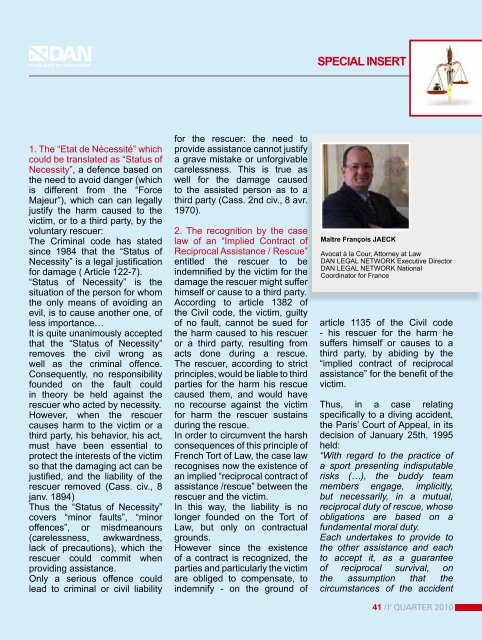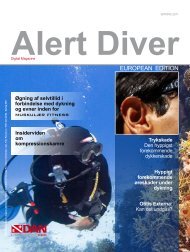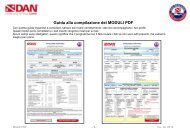Alert Diver - DAN Europe
Alert Diver - DAN Europe
Alert Diver - DAN Europe
You also want an ePaper? Increase the reach of your titles
YUMPU automatically turns print PDFs into web optimized ePapers that Google loves.
1. The “Etat de Nécessité” which<br />
could be translated as “Status of<br />
Necessity”, a defence based on<br />
the need to avoid danger (which<br />
is different from the “Force<br />
Majeur”), which can can legally<br />
justify the harm caused to the<br />
victim, or to a third party, by the<br />
voluntary rescuer:<br />
The Criminal code has stated<br />
since 1984 that the “Status of<br />
Necessity” is a legal justification<br />
for damage ( Article 122-7).<br />
“Status of Necessity” is the<br />
situation of the person for whom<br />
the only means of avoiding an<br />
evil, is to cause another one, of<br />
less importance…<br />
It is quite unanimously accepted<br />
that the “Status of Necessity”<br />
removes the civil wrong as<br />
well as the criminal offence.<br />
Consequently, no responsibility<br />
founded on the fault could<br />
in theory be held against the<br />
rescuer who acted by necessity.<br />
However, when the rescuer<br />
causes harm to the victim or a<br />
third party, his behavior, his act,<br />
must have been essential to<br />
protect the interests of the victim<br />
so that the damaging act can be<br />
justified, and the liability of the<br />
rescuer removed (Cass. civ., 8<br />
janv. 1894)<br />
Thus the “Status of Necessity”<br />
covers “minor faults”, “minor<br />
offences”, or misdmeanours<br />
(carelessness, awkwardness,<br />
lack of precautions), which the<br />
rescuer could commit when<br />
providing assistance.<br />
Only a serious offence could<br />
lead to criminal or civil liability<br />
for the rescuer: the need to<br />
provide assistance cannot justify<br />
a grave mistake or unforgivable<br />
carelessness. This is true as<br />
well for the damage caused<br />
to the assisted person as to a<br />
third party (Cass. 2nd civ., 8 avr.<br />
1970).<br />
2. The recognition by the case<br />
law of an “Implied Contract of<br />
Reciprocal Assistance / Rescue”<br />
entitled the rescuer to be<br />
indemnified by the victim for the<br />
damage the rescuer might suffer<br />
himself or cause to a third party.<br />
According to article 1382 of<br />
the Civil code, the victim, guilty<br />
of no fault, cannot be sued for<br />
the harm caused to his rescuer<br />
or a third party, resulting from<br />
acts done during a rescue.<br />
The rescuer, according to strict<br />
principles, would be liable to third<br />
parties for the harm his rescue<br />
caused them, and would have<br />
no recourse against the victim<br />
for harm the rescuer sustains<br />
during the rescue.<br />
In order to circumvent the harsh<br />
consequences of this principle of<br />
French Tort of Law, the case law<br />
recognises now the existence of<br />
an implied “reciprocal contract of<br />
assistance /rescue” between the<br />
rescuer and the victim.<br />
In this way, the liability is no<br />
longer founded on the Tort of<br />
Law, but only on contractual<br />
grounds.<br />
However since the existence<br />
of a contract is recognized, the<br />
parties and particularly the victim<br />
are obliged to compensate, to<br />
indemnify - on the ground of<br />
SPECIAL INSERT<br />
Maître François JAECK<br />
Avocat à la Cour, Attorney at Law<br />
<strong>DAN</strong> LEGAL NETWORK Executive Director<br />
<strong>DAN</strong> LEGAL NETWORK National<br />
Coordinator for France<br />
article 1135 of the Civil code<br />
- his rescuer for the harm he<br />
suffers himself or causes to a<br />
third party, by abiding by the<br />
“implied contract of reciprocal<br />
assistance” for the benefit of the<br />
victim.<br />
Thus, in a case relating<br />
specifically to a diving accident,<br />
the Paris’ Court of Appeal, in its<br />
decision of January 25th, 1995<br />
held:<br />
“With regard to the practice of<br />
a sport presenting indisputable<br />
risks (…), the buddy team<br />
members engage, implicitly,<br />
but necessarily, in a mutual,<br />
reciprocal duty of rescue, whose<br />
obligations are based on a<br />
fundamental moral duty.<br />
Each undertakes to provide to<br />
the other assistance and each<br />
to accept it, as a guarantee<br />
of reciprocal survival, on<br />
the assumption that the<br />
circumstances of the accident<br />
41 /<br />
3 / I FIRST 2010














